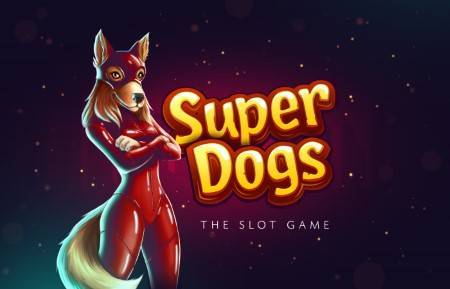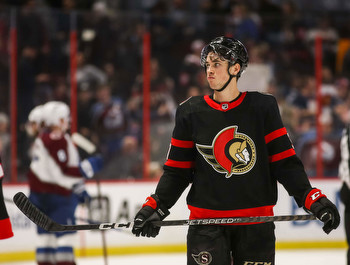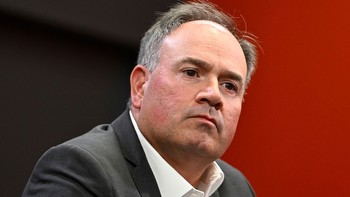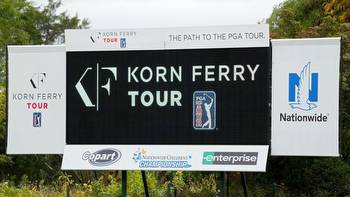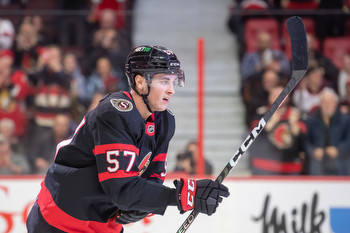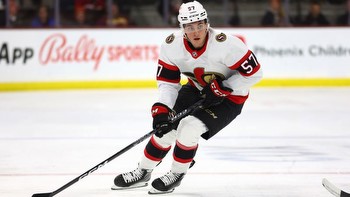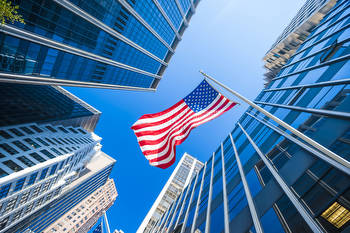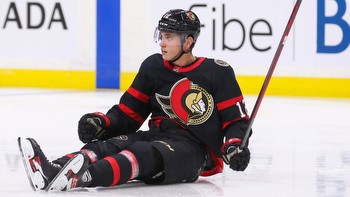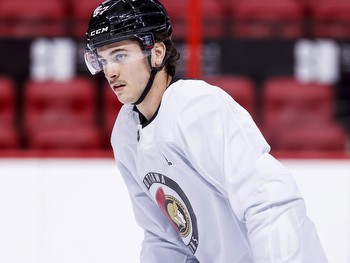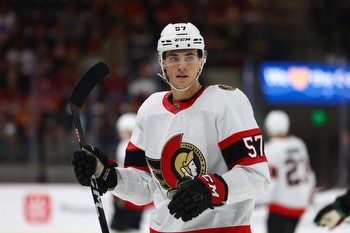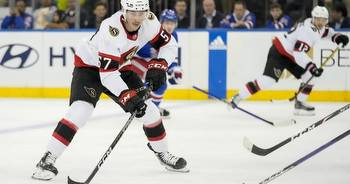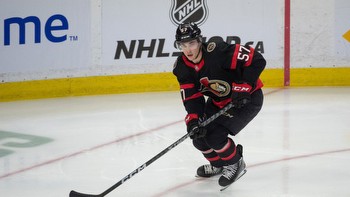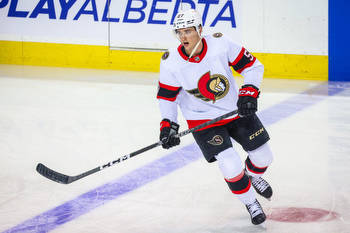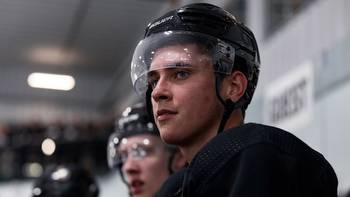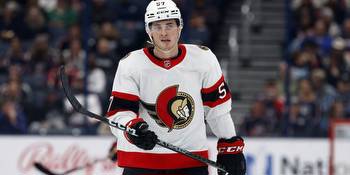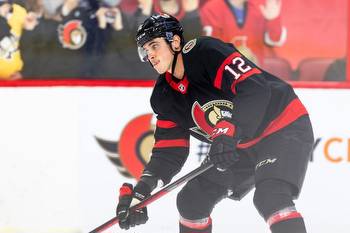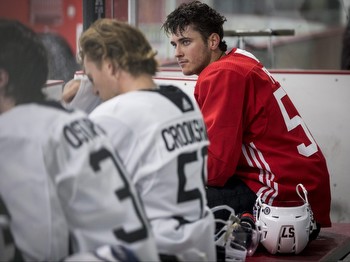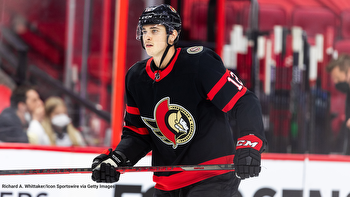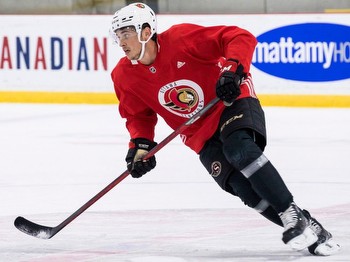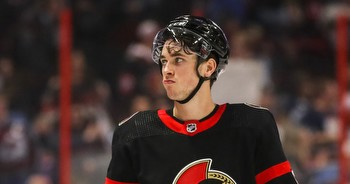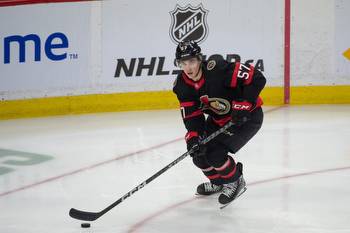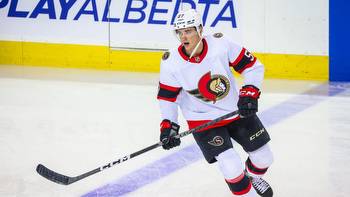NHL Falls Far Short On Transparency With Pinto Suspension
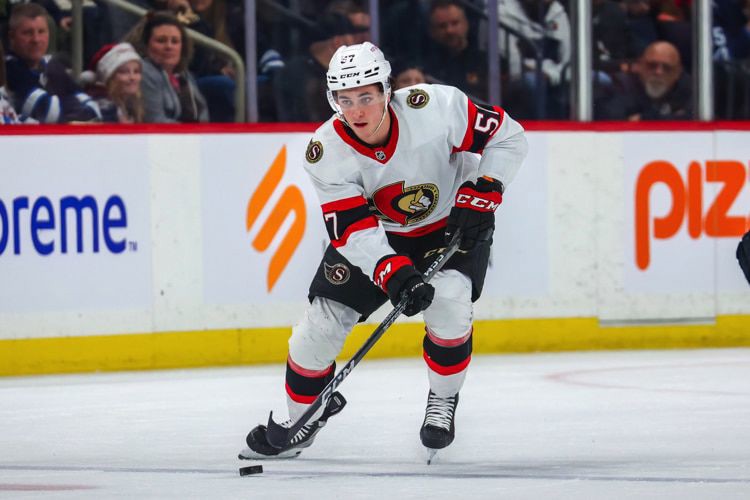
As the saying goes, you only get one chance to make a first impression.
And if this is how the National Hockey League is going to interact with the sports betting public regarding player suspensions for wagering-related transgressions, this first impression is a chance badly blown.
Last Thursday Ottawa Senators free agent forward Shane Pinto received a 41-game suspension for “wagering-related activities.” That’s about all the NHL would tell us about what he did.
What makes the league’s lack of transparency all the more disappointing is that the NHL already had a practice run of sorts when it comes to public relations and sports wagering and seems to have learned nothing from it.
The Vegas Golden Knights inexplicably partnered with a Mexico-based tout service, UPick Trade, in 2021 and terminated the deal less than a week later in the wake of intense social media blowback. In that instance, the league sat on its hands while “Gambling Twitter” served as the court of public opinion and brought up the myriad issues that could possibly go wrong with such a partnership.
The suspension of a player by the league is obviously a different matter, as it is subject to terms of the collective bargaining agreement between the NHL and its Players’ Association. But the 55-word statement that accompanied Pinto’s suspension offered no details beyond confirming he did not bet on NHL games. That near-silence does no one any good — not the player, not the league, not the sport, and not the sports betting industry.
Player suspensions a ‘when,’ not an ‘if’
In this still rapidly expanding world of legal sports wagering, one that will see betting handle top $100 billion by year’s end, practically every sports league at every level at some point is going to have to deal with one of its players running afoul of wagering rules.
In fact, the day after the league handed down Pinto’s half-season ban, the PGA suspended two golfers on the Korn Ferry Tour for wagering on PGA events.
Phil Mickelson got his share of headlines for his betting activity, but this was the first instance of the PGA suspending players. But like the NHL, the PGA offered few details about what led to the suspension, other than pointing out Vince India and Jake Staiano placed bets on PGA events they did not participate in. That’s one step further than the NHL, but also nowhere near enough.
The NFL has worked through some growing pains of its own following the suspension of numerous players during the offseason and also has been relatively transparent about the process and about what players can and cannot do. While Calvin Ridley bet on NFL games and remains the most high-profile example, many of the suspensions have come about because players have made the mistake of placing permissible wagers from impermissible locations.
Of course, the NFL faces more pressure to be transparent than other leagues because it is the sport that most moves the wagering needle. No one is saying the NFL has it absolutely right — far from it — but the sports viewing and sports betting public can readily identify the league’s efforts, at least.
The NBA and Major League Baseball have yet to have any players suspended for wagering-related activities in this era of legalized betting. But if last week’s events are any indication, it’s only a matter of time.
What did Pinto do to warrant suspension?
As one of maybe six Senators fans in the United States, I find Pinto’s suspension aggravating, even if it’s completely warranted. He is an important piece to the team’s make-up and impacted expectations Ottawa can make its first playoff appearance since 2017.
The 22-year-old Pinto finished fourth among all rookies with 20 goals last season and was solid on faceoffs with a 52.1% win rate. A youthful core bolstered by the return of Josh Norris would potentially have let Pinto thrive as a third-line center while contributing to the second power-play unit.
While the fan base impatiently waited to sign the restricted free agent to a new deal, thinking the Senators were trying to find space under the salary cap, published reports have shown the league and the Players’ Association were in negotiations last month to finalize terms of Pinto’s suspension.
But if Pinto did not wager on NHL games, as the league clearly stated, what did he do that merited a 41-game suspension and included a confidentiality clause in which neither Pinto nor the league can discuss the details of the suspension in any format? Did he share locker room information on player health statuses with his friends or with bettors? Did a friend or a contact wager on NHL games by proxy on his behalf? Did he make wagers in an illegal market?
The league chose not to address these questions, and until it does, the speculation will hover over Pinto. Compare the silence to communication on suspensions meted out for on-ice play, which occasionally come with an instructional video from NHL headquarters detailing in Zapruder-like fashion what warranted the punishment.
Also consider the by-laws of the league’s CBA in which gambling on NHL games is prohibited but the league’s constitution allows gambling on other sports. That gulf in between, combined with the league insisting he did not bet on NHL games, leaves enormous room to wonder what he did.
Transparency makes sound business sense
Pinto has been suspended for something related to sports betting. It’s hard to ignore that the league makes deals with sportsbooks, teams make deals with sportsbooks, and sportsbooks make deals with league rights’ holders to buy ad time. It is very much an interconnected ecosphere in which the player is the central to it all.
iGaming Ontario reported nearly $1.9 billion CAD sports betting handle ($1.37 billion U.S.) and $118 million CAD revenue ($85.4 million U.S.) for the three-month period from July through September. It is roughly equivalent to monthly figures from New York — the largest market in the U.S. — but Canada has clearly shown itself to be a significant player in its own right.
The province recently banned athletes from being used in sports betting ads to “safeguard children and youth who can be particularly susceptible to such advertising content.”
The NHL failing to be transparent about Pinto shows little confidence in a betting public fully capable of separating the details of the incident from the principals (player, bettor, and specific sportsbook) in the incident.
Transparency could also serve to prevent the public from asking questions, such as: What is the league doing to prevent it from happening again? What is the sportsbook doing? Should this occurrence cause the league to address and perhaps refine its rules? What are the league and/or sportsbook doing to help educate the player? What are they doing to educate other players? How does it impact responsible gambling in the market where this occurred? Are there teachable moments for all entities?
Leagues and sportsbooks want us to love their products, but it cannot be unconditional love. Sports wagering requires a level of knowledge to engage with the product. Without transparency, there will be reluctance to engage. The NHL must realize that going forward.
